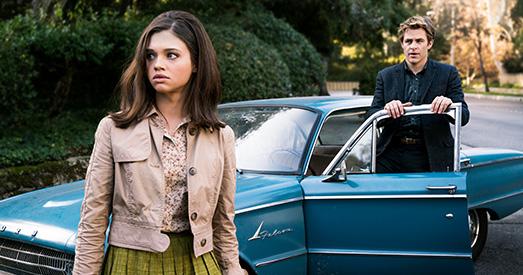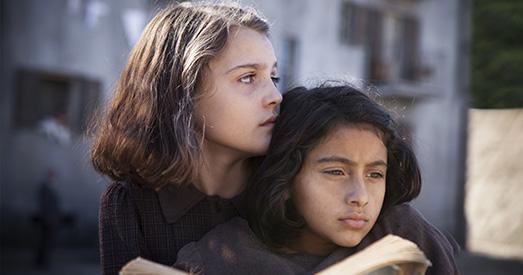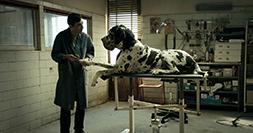The American Film Institute’s annual film festival is arguably Los Angeles’ best and most comprehensive annual fete of feature, documentary, short, animated, domestic and foreign cinema. Here are capsule reviews of some of AFI Fest 2018’s myriad productions.
NON-FICTION -
The son of film/TV director Jacques Remy (best known for directing the Inspector Maigret series), Olivier Assayas continues the aesthetic of the French New Wave’s auteurs. His sensibilities seem to range from Francois Truffaut’s (when it comes to romance) to Jean-Luc Godard’s in terms of politics (if not film form). His previous movies include the 2002 thriller Demonlover and works dealing with leftwing subjects - 2010’s Golden Globe winner Carlos, about terrorist “Carlos the Jackal,” which scored Edgar Ramirez Emmy and Golden Globe acting noms, plus 2012’s superb Something in the Air, about French radicals shortly after the May 1968 student-worker uprising.
Screened at the TCL Chinese 6 Theatres on Hollywood Blvd., Assayas’ new feature, Non-Fiction (its title in French is Double Vies, which means “Double Lives”), takes an insightful look at the changes
sweeping book publishing as high tech digital modes upend the print cosmos, just as Gutenberg’s printing press affected the creation and consumption of handmade illuminated manuscripts about 600 years ago. This is a complex topic made all the more complicated by having, ironically, non-French speakers read the English subtitles, as the Gallic characters wax philosophical about print versus pixels, reading on paper as opposed to on screens in the form of e-books, Kindle and so on as new technology challenges the traditional.
The writer/director succeeds in doing so by dramatizing the dilemma with characters embodying aspects of this brave new world. Non-Fiction’s best known thesp is Juliette Binoche, who co-starred in Assayas’ mediocre, Swiss-set 2014 Clouds of Sils Maria, also as an actress. Here she portrays Selena, who stars in a weekly run of the mill policier TV series, and is married to Alain (Guillaume Canet), chief of a renowned publishing house caught up in the throes of techno upheaval.
Léonard Spiegel (Vincent Macaigne) is a novelist who writes what he describes as “auto-fiction”, largely derived from his real life and often dealing with his extramarital relationships. Leonard expresses unconventional, antiestablishment views and is, perhaps, Jewish. He is married to Valerie (Nora Hamzawi) - a dedicated political aide of a Socialist Party (like books, another endangered species) politician - while Leonard’s viability as a writer is threatened by the digital onslaught being unleashed against book publishing.
This phenomenon is personified by Laure (Christa Théret, who interestingly appeared in Costa-Gavras’ 2005 look at outsourcing, The Axe, and is co-starring in the upcoming The Fox, presumably an adaptation of D.H. Lawrence’s novel ), hired by Alain to bring his prestigious but conventional publishing house kicking and screaming into the 21st century. Quite cleverly, this tech savvy sexy young woman who has one foot in the print world and the other in cyberspace is bisexual.
This being a French film, most of the married characters have affairs - but unlike Woody Allen’s movies which abound with couple-fluid partnering up, Non-Fiction isn’t very funny. It is intended to be more of a drama than a comedy, although it does have some lighter moments, and Leonard in particular can be amusing. Interestingly, the various spouses are never depicted having sex with their married partners - only with the lovers they are being unfaithful with. What is Assayas essaying to say in this rumination on adultery, love, sex, marriage and literature?
In any case, Non-Fiction also evinces lefty undercurrents and according to IMDB.com, Assayas’ next production, Wasp Network, is another politically themed movie about five Cuban political prisoners inside the U.S.A., co-starring Ramirez, Penelope Cruz and Gael Garcia Bernal. When I interviewed Assayas circa 2012 about his post-May ’68 film Something in the Air (called Après Mai in French), I asked him: “Does part of you still dream and hope there could be a revolution?”
Olivier Assayas responded: “Yes. But as much as I believe in those political movements, as much as they give one hope, because it gives a notion that youth again believes that it can have a collective effect on society, the way they envision politics is very different from whatever the 1970s’ were. Because for good or bad the 1970s were Utopian. The 1970s believed in the possibility of turning society upside down, of taking over. It was Utopian, but then it had some sort of reality because at least in France we had a model, which was May ’68, which was like three years old, and it comes as close as it gets to being an actual revolution. So, yes, this dream of a revolution, it was Utopian, but then it was also grounded into something that had actually happened, that had a solid reality. Today, people don’t think of a revolution. They think of adapting society, of making the hope of more fairness, more justice, more social justice, more generosity, which are old things - the modern world has become so brutal that of course, you have to recognize and endorse. But in the 1970s it would have been called ‘reformist,’ which was an insult.”
I Am the Night:
The first episode of the new TNT mini-series I Am the Night was screened at the Egyptian Theatre, the beloved movie palace on Hollywood Blvd. Co-directed by Patty Jenkins (Wonder Woman), the six-parter is a mystery inspired by the real life gruesome so-called “Black Dahlia” unsolved L.A. murder case of 1947. As scripted by Sam Sheridan, I Am the Night is redolent with reflections on race, class, gender and full of sensationalism and tawdry sexuality in a basic cable kind of a way.
India Eisley (daughter of actress Olivia Hussey of Franco Zeffirelli’s popular 1968 Romeo and Juliet) stars as the real life Fauna Hodel, who co-wrote and co-produced Night. Her supposedly bi-racial adopted character comes to L.A. in the mid-1960s to connect with her biological family. Thrills and chills ensue in the City of the not so Angelic. There, Chris Pine (Star Trek, Outlaw King) plays Jay Singletary, a down-on-his-luck reporter with a past who has become a paparazzi-like scribbler and shutterbug. The first installment in the cable channel’s mini-series indicates that his comedown in the world is tied to his earlier coverage of the sinister Black Dahlia case, which to this day has never been solved. Not even Inspector Maigret could crack the case!
Although one suspects that I Am the Night will try to shed some light on the enduring creepy crime puzzle! Stay tuned - the mini-series premieres in January 2019 on TNT.
For more info: http://www.afi.com/afifest/.
The third edition of “The Hawaii Movie and Television Book”, co-authored by L.A.-based reviewer Ed Rampell, is available at: https://mutualpublishing.com/product/the-hawaii-movie-and-television-book/.



